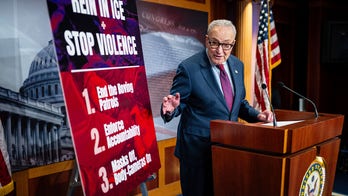Fox News Flash top headlines for November 17
Fox News Flash top headlines are here. Check out what's clicking on Foxnews.com.<br>
President Trump’s announced plan to withdraw troops from Afghanistan and Iraq has been met with mixed reactions with some Republicans pushing back on the idea, but President-elect Joe Biden has been relatively mum.
Biden’s silence on troops in Afghanistan and Iraq have many wondering how he will handle the remaining troops left in the two countries once he enters office.
In a 2012 tweet while serving as vice president during the Obama administration, he said that U.S. troops would be out of Afghanistan by 2014 – a goal that was not met.
"VP on Afghanistan: "We will leave in 2014," he wrote.
Biden voted against the war in Iraq in 1991 under President George H. W. Bush, but 10 years later following the attacks on Sept. 11, 2001, the Democratic senator from Delaware voted in unanimous consent for the war in Afghanistan. He then supported sending troops to Iraq in 2003 – a choice he seemingly grappled with in the years following, calling it a "mistake."
But in 2007 he voted against a $94.4 billion proposal which would have forced then-President George W. Bush to put together a withdrawal plan from Iraq.
"I want to ask any of my other colleagues, would they, in fact, vote to cut off the money for those troops to protect them?" Biden told Tim Russert in September 2007. "This isn’t cutting off the war. This is cutting off support that will save the lives of thousands of American troops."
Biden’s son Beau, a captain in the Delaware Army National Guard, deployed to Iraq in October 2008 – a move that some have thought may have altered his stance on U.S. troops in the Middle East.
By 2009, as vice president, he tried to persuade Obama not to send an additional 30,000 troops to Afghanistan.
PENTAGON BEGINS PLANNING FOR TROOP DRAWDOWNS IN AFGHANISTAN AND IRAQ
"You might get a position where you’ve got to make a really tough god----ed decision on this," Biden reportedly warned.
Biden will be inaugurated on Jan. 20, 2021, meaning he will have the ability to reverse Trump’s plans to stop the "endless wars" in the Middle East or see them through – though which he will do remains unclear.
The president-elect surprised voters in September after he told Stars and Stripes that he would likely maintain a presence in the region to see through the Taliban-Afghan government peace deal and ensure stability against forces like ISIS.
"These ‘forever wars’ have to end. I support drawing down the troops. But here’s the problem, we still have to worry about terrorism and [the Islamic State]," Biden reportedly told the publication.
"I think we need special ops capacity to coordinate with our allies," Biden said, adding that he thinks "1,500 to 2,000" troops would likely remain.
Trump is expected to order U.S. troops be cut roughly in half to 2,500 troops in Afghanistan, while Iraq would also see 500 troops removed, leaving 2,500 in the Levant nation.
But Biden is not alone in his belief that some troops should stay behind.
"A small minority in both parties seem to think it's in America's power to unilaterally resolve conflicts by simply walking away from them," Sen. Mitch McConnell said on the Senate floor following the White House’s announcement.
"We're playing a limited, but important role in defending American national security and American interests against terrorists who would like nothing more than for the most powerful force for good in the world to simply pick up our ball and go home," he said. "They would love that."
CLICK HERE TO GET THE FOX NEWS APP
"Of course, all wars must end," McConnell said. "The question is now how they end, and whether the terms on which they end are favorable or unfavorable to the security and interests of the United States."














































